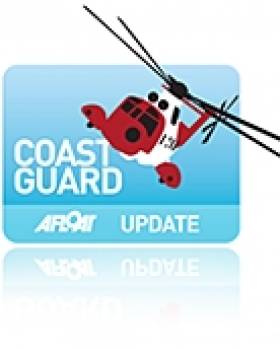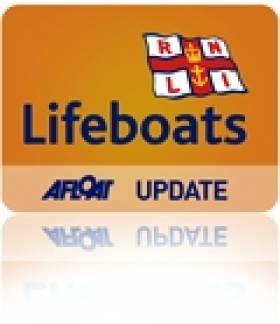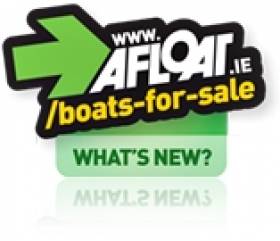Displaying items by tag: engine
Coleraine Marine Firm, Tony's Marine Service (TMS), Celebrates 25 Years in Business
Tony's Marine Service (TMS), a Northern Ireland marine engine and boat service specialist is celebrating 25 years in business in 2015.
Located in Coleraine on the North Coast of Northern Ireland, TMS was founded in 1990 by local man Tony Hodges.
TMS offers repairs, servicing, diagnostics, winterisation, boat modification and upgrades, valets and storage to private boat owners and clients across the public and private sectors.
It has an on-site chandlery store which stocks a selection of chandlery goods, safety equipment and maintenance products.
Operating under its own Xtreme Boat Sales brand, TMS also offers a range of boats for purchase and is the sole distributor in Ireland for US-manufactured Glastron sports boats and cruisers.
Hodges, who continues to adopt very much a hands-on approach to running the business, said that 2015 was set to be a very big year for TMS.
"I am very proud that, 25 years after establishing the business, TMS continues to go from strength to strength with new customers coming onboard on a regular basis.
Hodges is planning an exapnsion in his anniversary year and aiming for expanded sales across the United Kingdom, the Republic of Ireland and beyond with some new promotions in 2015.
"with the economic outlook now looking more positive than for many years, I believe it is the right time to move the business into a new gear with the clear aim of expanding our operations, both geographically and in scale.
Tony's Marine Service (TMS) was established by Hodges in 1990 after he'd spent several years working as a mechanic at Coleraine Boat Centre on the banks of the River Bann.
TMS moved to its present site in 1992, which now incorporates a purpose-built workshop facility capable of holding up to four boats, an engine re-build room, an office, shop, store and a staff area.
Xtreme Boat Sales, the boat sales arm of TMS, was established in 2004 and operates from the same site.
Many Angling Boats Suffer Engine Failure - UK Coastguard
"Many of our angling-related incidents this year have involved angling boats suffering engine failure and having to be towed to safety by lifeboats," says Mario. "This sort of incident doesn't only happen to anglers but is avoidable if you ensure that your engine and boat are well maintained and capable. It may be also be useful to take a set of oars or a spare engine with you. And make sure that you know how to raise the alarm should something go wrong.
"Several angling boats also sank this year causing some anglers to fall into the water. Some were not wearing lifejackets or buoyancy aids when they were rescued; they were very lucky indeed.
"As a search planner, I know that it's really difficult to find a person who is not wearing a lifejacket, if they are still afloat, in a vast expanse of water. Wearing a lifejacket will keep you afloat, despite the effects of cold shock, hypothermia, disorientation, injury or weather conditions. It will also hugely improve your chances of being found by rescuers.
"A couple of months ago one angler in particular, whose boat had overturned at night, was not only kept afloat by his lifejacket, but was located by the helicopter search light picking out the reflective strips on his lifejacket. He was taken to hospital in poor condition, but made a full recovery; and no doubt owes his life to the £30 "life insurance" he invested in that lifejacket.
"Some anglers have fallen from rocks and cliffs in to the sea and suffered severe injuries. These areas, by their very nature are slippery, adjacent to deep water, big swells and tide rips and are very difficult to climb back on to should you fall in the water.
"In a recent very tragic incident, a lone middle-aged angler went to fish from rocks. He never returned. To date, despite intensive searching, nothing has been found of him or his gear; and his car was in the car park where he left it. He did not use a lifejacket or mobile phone and had not told anyone where he was going. If you're fishing in a place where you are likely to fall, slip or capsize, into deep, or fast flowing water especially where it will be difficult to get out wear a lifejacket. It could save your life.
"There have also been a few close calls with anglers and bait collectors getting cut off by tides, one in particular, a non swimmer, was up to his neck in water when rescued. So remember to check tidetables before you set out and don't take risks – the tide comes in more quickly than you think."
Angling from kayaks is an up and coming sport but I am pleased to report that it's causing us no real problems at the moment. One small issue is that members of the public report them to the Coastguard because they think that they are in trouble, due to their small size and inactivity. So if you're a kayaking angler let the Coastguard know where you are going and when you expect to leave. Other good safety advice is to get a buddie, get trained, carry the appropriate safety gear, name your kayak and join the Maritime and Coastguard Agency Small Boat Safety Scheme (CG66), it's free and could save your life, full details here: http://www.dft.gov.uk/mca/mcga07-home/emergencyresponse/mcga-searchandrescue/cg66.htm
"As well as providing search and rescue coordination for the whole of the UK coastline, HM Coastguard also covers some inland waters such as the Norfolk Broads and some lakes, loughs and lochs. However, my advice is relevant for all anglers, whether salt, freshwater or both.
"You are invited to complete a survey on the wearing of lifejackets and then watch a short video about them, this can be found on line from the following link; please help us to help you."
http://feedback.mcga.gov.uk/v.asp?i=34223yhqfn
Stay safe – The rules are simple –
Before heading out onto the water, or any other potentially dangerous area:
get trained;
familiarise yourself with the area (in good weather and daylight);
get local advice;
check weather and tides;
wear a lifejacket if appropriate;
avoid alcohol;
keep in touch. (tell someone where you are going and when you will be back and let them know any change of plan, and who they should call if you do not return); and
fish with a friend.
Every coastguard station will provide free information leaflets and booklets covering the above. Visit you local station and see what is available.
Remember, the Coastguard is there for all water users including anglers, so if you or someone else is in trouble on or in the water, including medical problems, dial 999 and ask for the Coastguard or call us on VHF Channel 16.
Lough Derg Lifeboat Launches for Broken Down Motor Boat
At 19.31hrs the lifeboat launched with helm Eleanor Hooker, Ger Egan and Ben Roynane on board. Winds were west south-west, Force 4, visibility was fair with darkness falling. After drifting for some distance, the skipper had dropped anchor to prevent being grounded. They were located by the lifeboat behind the Carrigeen Islands, close to the County Clare Shore.
The three persons on board were all safe and wearing lifejackets. The lifeboat was alongside the casualty vessel, a 28ft motor boat at 19.50hrs. With an RNLI crew member on board, a tow line was set up. The anchor was held fast and given the conditions and nightfall, it was left behind. The vessel was towed to Dromineer Harbour and tied up safely alongside at 20.40hrs. The lifeboat returned to station and was ready for service again at 21.00hrs.
Boats to be Sold in Cork Liquidation Sale
Fancy a pre-season boat bargain? It may well be on offer later this month at a 'liquidation sale of boats' due to take place in County Cork with a selection of unused and used power boats. The sale is by order of Mr. Barry Donohue, KPMG, Liquidator, HM Yachts Ltd (In Voluntary Liquidation).
The boats on offer include three unused Jeanneau motoboats inlcuding the popular Merry Fisher Legend. The vessel comes with Suzuki 50HP Four Stroke Engine and road trailer, ready for the season!
The sale will take place at 12 noon on Tuesday 29 March 2011. Viewing is from 10am - 4pm Monday 28 March 2011 or by appointment. The sale takes place at the Michael Murphy Yard, Mission Hill, Kinsale, Co. Cork. (Across from Bandon Co-Op)

For sale: The Merry Fisher Legenda 585 Motor Boat
There are ten lots (including a van) but for the boats for sale include:
Unused Jeanneau Cap Camarat 715wa Motor Boat with a Hallmark Double Axle Trailer with Winch and Rollers, White / Blue.
Unused Jeanneau Cap Camarat 515 Style Motor Boat with a Suzuki 50HP Four Stroke Engine, Model DF50, Plus a Hallmark Single Axle Trailer with Winch and Rollers, White / Beige.
Unused Jeanneau Merry Fisher Legenda 585 Motor Boat with Enclosed Cabin with an Indspension Roller Coaster Single Axel Trailer with Winch and Rollers, White / Blue.
2006 Maxum 2400 SC3 26ft Motor Boat with 300Hp Petrol Inboard Engine with Double Axle Trailer, White / Blue.
2005 O'Sullivans Marine 710 23ft Fishing Boat with Cabin, Yanmar 27hp Diesel Inboard Engine, White / Blue, Name Mary-Linda.
For further details, please contact E-Auctions T: +353 45 883 554. More HERE.

































































